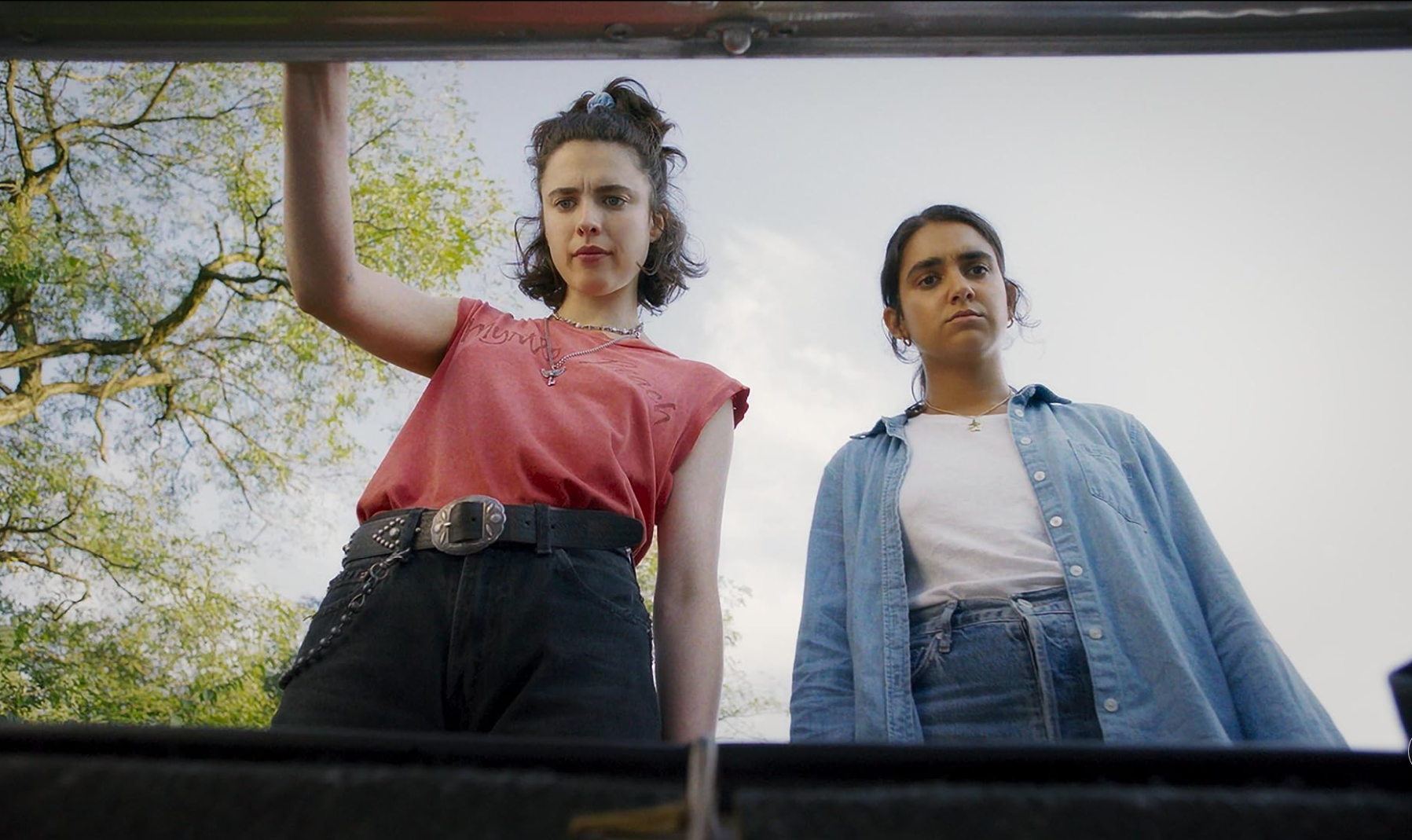
“Drive-Away Dolls” is an inspired throwback to a very particular type of film that was in abundance in the mid-‘90s. Titles like “The Doom Generation,” “Freeway,” “Love and a .45,” and “Buffalo ‘66” amongst many others that were an oddball merging of the road comedy and crime story populated by larger-than-life characters that drove a narrative of collision between the elements, all while usually commenting on some aspect of American society. This small window of sub-genre was seemingly borne on the backs of the independent movie movement, but also movies like “Blood Simple” and “Raising Arizona”—so it’s only fitting that one of the godfathers of this niche cinematic motif returns to the scene of the crime. Co-writer and director Ethan Coen (working with co-writer and editor Tricia Cooke) has crafted a joyful nod to that film type while also creating something wholly original. “Drive-Away Dolls” is raucous in all the best ways, creating memorable characters and hilarious scenes that may feel familiar but are truly unique.
It’s 1999 and Jamie (Margaret Qualley) has stepped out on her girlfriend, Sukie (Beanie Feldstein), one too many times. Looking to get away, especially after being kicked out, she manages to entangle herself in the plans of her friend, Marian (Geraldine Viswanathan), who is about to go to Tallahassee to see an aunt. Jamie convinces Marian to use a “drive-away” service where the women will drive a car from Philadelphia to Florida and deliver it to the owner there. Unfortunately, they’ve been handed the wrong car with some sensitive materials inside it, leaving The Chief (Colman Domingo) to dispatch his goons (Joey Slotnick, C.J. Wilson) to find the ladies and retrieve what’s in the trunk. Jamie and Marian are unaware of the targets on their backs, or the stuff in the trunk, but must somehow evade these men as they also seek out love on the road.
A particularly impressive element of “Drive-Away Dolls” is that every character is essentially a caricature, but they never feel that way. Through the specific dialogue, lived-in performance, and careful direction, they come across as genuine people that viewers will actually be invested in. Qualley’s aphorism-spouting Texan hayseed is all loud bluster and drawl, but it’s fueled by real heart and grounded in just enough softness (through interactions with Viswanathan’s character) that you see them as a person and care about them as such. This is true across the board for all the amazing characters that Coen and Cooke created; you may not care if they all live or die, but they all supersede the grandiose cutout that they seem to be in order to become a flesh-and-blood human worthy of attention (and not derision). It’s an important feat and a necessary one so the comedy can build upon that sturdy foundation.
It’s a testament to Coen and Cooke that they are able to find so many different avenues for comedy in “Drive-Away Dolls.” There are the situations themselves (such as awkward interrogations), the dialogue-driven source (with ratatat conversations creating a jaunty rhythm and building absurdity), the character-driven elements (placing these outsized personalities in otherwise normal situations), and more—all of them carefully deployed to great effect. Nothing ever overstays its welcome, including the film itself which clocks in at a breezy 84 minutes. But that’s further proof of the genius of the filmmakers: nothing feels slight or too little. A scene occurs where a gag happens and/or a bit of dialogue ensues—and then it’s on to the next, but never feeling rapid fire or leaving the audience feeling unfulfilled. It’s consummately timed to ensure that “Drive-Away Dolls” is all killer, no filler and delivers a tremendous experience in doing so.
One element that’s surprising, in a disappointing way, is that the film is not especially visually arresting. DP Ari Wegner has done amazing work in the past (“Lady Macbeth,” “In Fabric,” “Zola”) so it must have been at the direction of Coen that there aren’t too many impressive visual feats in the movie. Make no mistake, it’s not that “Drive-Away Dolls” looks bad—it resembles a thriller during those instances where it needs to, and it otherwise captures everything well enough—but it would be nice if there were more flourish to the cinematography. There are a few scenes of psychedelia (related to the MacGuffin’s origins) and some shots stand out here and there, but mostly it feels like the camera is in service to the script and not a partner in the storytelling. Again, not that it ruins anything, but it holds it back from achieving even greater heights (and, honestly, being more akin to work that Coen has done with his brother Joel in the past).
“Drive-Away Dolls” is a bit of a pastiche, but without being twee OR maudlin. It’s a throwback to a very particular time in cinema that works tremendously well thanks to excellent writing and outstanding performances. The film feels like something people would discover late at night on IFC or HBO back in the day, slowly becoming a fan favorite and underground hit through its audacious story, hilarious characters, and memorable dialogue. Coen and Cooke have crafted a rousingly fun movie that may end up becoming a cult classic over the years. But, even if it doesn’t, it certainly has been made with great affection and attention, resulting in a terrific slice of ‘90s cinema here in 2024.
Starring: Margaret Qualley, Geraldine Viswanathan, Beanie Feldstein, Pedro Pascal, Colman Domingo, Bill Camp, Matt Damon, Joey Slotnick
Director: Ethan Coen
-
8


